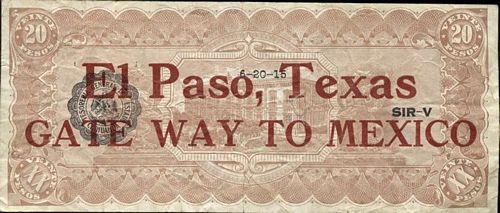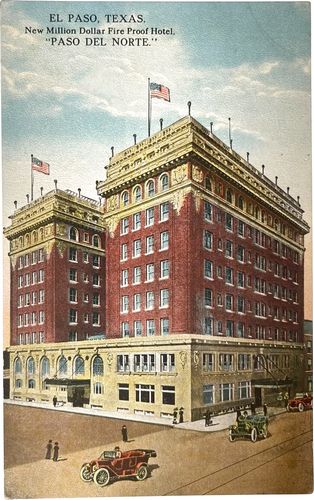Advertisements on Chihuahua notes - Shops and suppliers (El Paso)
'El Paso, Texas / GATE WAY TO MEXICO'. known on $20 dos caritas
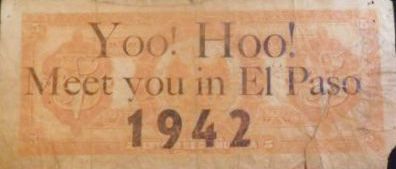
'Yoo! Hoo! / Meet you in El Paso / 1942' on $5 Banco del Estado.
In June 1915 El Paso’s delegation to the Adclub convention at Chicago distributed large amounts of advertising features, including 1,000 pesos of new Villa currencyEl Paso Herald, 16 June 1915. At a Press Association meeting in October 1915 G. H. Clements, El Paso publicity director of the chamber of commerce, presented an outlined program of entertainment and distributed booklets and several thousand pesos of Villa currency as souvenirsEl Paso Herald, 18 October 1915. In January 1916 El Paso delegates to the Overland Dealers excursion planned to distribute Villa currency as souvenirs. One money broker had given the automobile editor of The Herald an option on 500,000 pesos at a very low rateEl Paso Herald, 13 January 1916.
Sol Berg
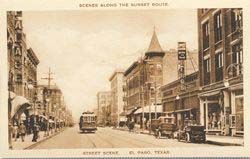
Sol. I. Berg's store on the right
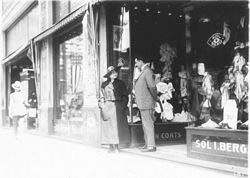
Sol. I. Berg in front of his store
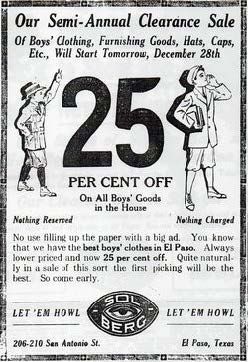 Solomon Isaac Berg, a German immigrant, came to El Paso in 1899 to work for B. Blumenthal’s clothing store. Shortly after arriving in El Paso, Mr. Berg met his future wife Jeane ‘Jennie’ Weiler, a Swiss lady who was visiting friends in Ciudad Juárez. The couple married on 10 January 1904 at the home of Mr. Blumenthal & had two children, Julius and Florence. In 1903, Solomon opened his own clothing store, Sol I. Berg Inc., on the site of what would eventually become the Hotel Paso del Norte on S. El Paso Street. Mr. Berg quickly became regarded as a well-known and well-respected purveyor of fine clothing for the well-dressed men of El Paso. Even El Paso police officers wore uniforms provided by the Sol I. Berg emporium. In January 1910, the success of his business led him to relocate his shop to 206 E. San Antonio Street. Mr. Berg’s clothing company went bankrupt in April 1930, and he retired. He died at his home ‘Quinta Berg’ in Ysleta on 3 May 1935 at the age of 66.
Solomon Isaac Berg, a German immigrant, came to El Paso in 1899 to work for B. Blumenthal’s clothing store. Shortly after arriving in El Paso, Mr. Berg met his future wife Jeane ‘Jennie’ Weiler, a Swiss lady who was visiting friends in Ciudad Juárez. The couple married on 10 January 1904 at the home of Mr. Blumenthal & had two children, Julius and Florence. In 1903, Solomon opened his own clothing store, Sol I. Berg Inc., on the site of what would eventually become the Hotel Paso del Norte on S. El Paso Street. Mr. Berg quickly became regarded as a well-known and well-respected purveyor of fine clothing for the well-dressed men of El Paso. Even El Paso police officers wore uniforms provided by the Sol I. Berg emporium. In January 1910, the success of his business led him to relocate his shop to 206 E. San Antonio Street. Mr. Berg’s clothing company went bankrupt in April 1930, and he retired. He died at his home ‘Quinta Berg’ in Ysleta on 3 May 1935 at the age of 66.
'Let ‘Em Howl' was his catchphrase.
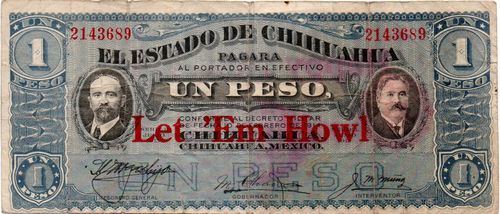
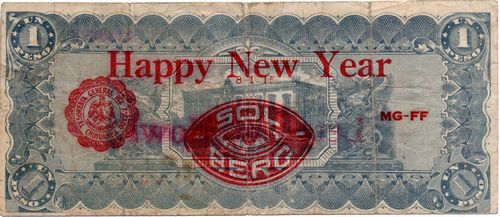
'Let 'Em Howl/Happy New Year SOL BERG', known on $1 dos caritas
La Calidad
"La Calidad" was a shoe warehouse.
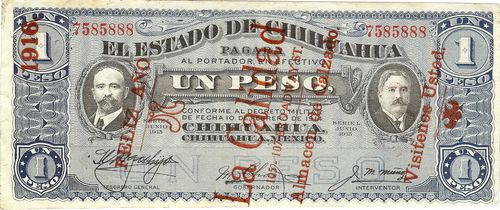
'1916 / FELIZ AÑO / La Calidad / 105-107 BROADWAY ST. / Almacen de Calzado / Visitenos Usted.', known on $1 dos caritas
La Ciudad de Mexico
"La Ciudad de México" was another show shop.
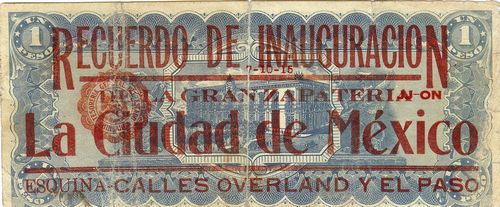
'RECUERDO DE INAUGURACION/DE LA GRAN ZAPATERÍA/La Ciudad de México/ESQUINA CALLES OVERLAND Y EL PASO', known on $1 dos caritas.
Fotografias Raff
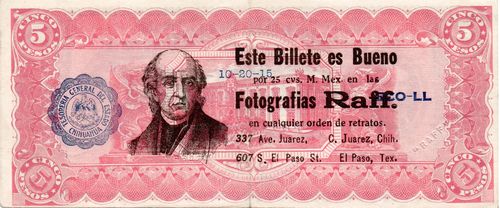
'Este Billete es Bueno / POR 25 cvs, M. Mex. en las / Forografias Raff. / en cualquier orden de retratos. / 337 Ave. Juarez. C. Juarez, Chih. / 607 S. El Paso St. El pasp, Tex.' and punched "RAFF" on 5c dos caritas.
El Maida Temple, El Paso
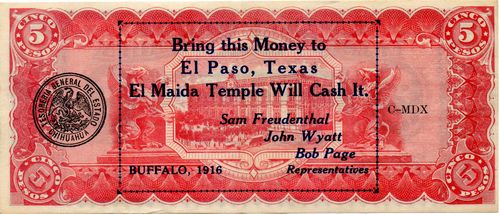
'Bring this MONEY to / El Paso, Texas / El Maida Temple Will Cash It. / Sam Freudenthal / John Wyatt / Bob Page / BUFFALO, 1916 Representatives', known on $5 dos caritas.
This counterfeit $5 note with its overprint will have been given away by members of the El Maida Shriners at the imperial shrine council in Buffalo, New York, in July 1916. According to an El Paso newspaper El Paso Herald, 7 July 1916 because of the uncertain conditions prevailing in El Paso, the trip of the El Maida patrol company to Buffalo was called off, but the shrine was represented by past potentates Samuel J. Freudenthal and John M. WyattFreudental was potentate in 1913, and Wyatt in 1909. Other potentates included mayor Thomas C. Lea in 1912 and Sol I. Berg in 1916 and high priest and prophet Robert W. Page.
El Paso Chamber of Commerce
At the end of December 1915 it was reported that the El Paso Chamber of Commerce had purchased large quantities of Villa currency for advertising purposesTucson Daily Citizen, 4 December 1915.
El Paso Medical Society
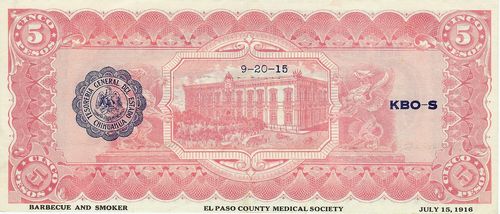
'Barbecue And Smoker El Paso County Medical Society July 15, 1916', known on $5 dos caritas
Hilton Drug Co.
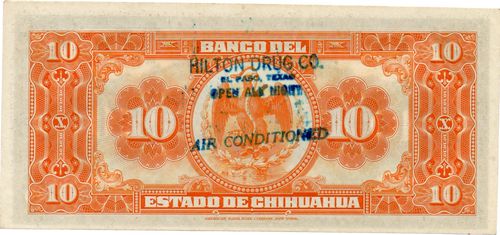
'AIR CONDITIONED / HILTON DRUG CO / EL PASO, TEXAS / OPEN ALL NIGHTS', rubber-stamped, known on $10 Banco del Estado
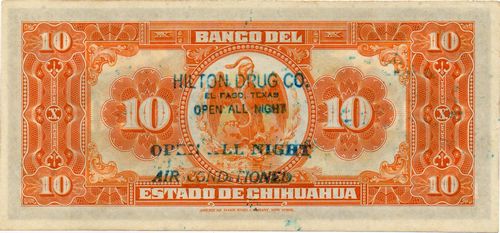
'HILTON DRUG CO. / EL PASO, TEXAS / OPEN ALL NIGHT/ OPEN ALL NIGHT/ AIR CONDITIONED', rubber-stamped, known on $10 Banco del Estado
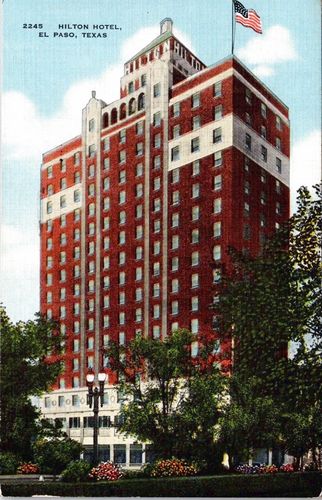
The Hilton Drug Company was located in the Hilton Hotel, at 106 Mills Avenue. The Hilton Hotel (now the Plaza Hotel) was constructed by Conrad Hilton in 1929, on the site of the Sheldon Hotel, which burned down in that year.
Texas Grand Grecian Theatre, Hotel Paso del Norte
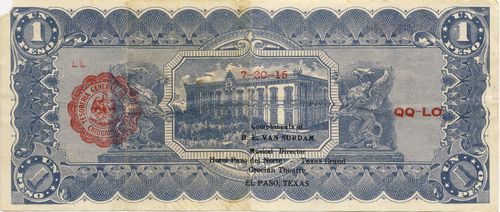
Compliments of / H. E. VAN SURDAM / Musical Director / Hotel Paso del Norte Texas Grand / Grecian Theatre / EL PASO, TEXAS, known on $1 dos caritas.
The El Paso Del Norte Hotel, designed by Henry C. Trost, opened in 24 November 1912. The building was made out of steel, brick and terra cotta. The interior was very elegant, especially the ornate lobby, which was topped with a Tiffany glass dome.
This hotel served various functions during the revolution. The rooftop served as a “ringside seat” to observe several revolutionary battles across the Rio Grande including the 1929 Escobar Rebellion in Ciudad Juárez. When Chihuahua’s governor Luis Terrazas fled to El Paso, he rented the entire top floor for his family along with their twenty-seven servants. General John Pershing and Pancho Villa, visited the hotel and Alvaro Obregón, Venustiano Carranza and John Reed stayed there during their visits to El Paso.
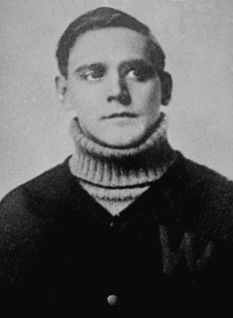 Henderson Edmund "Harry" "Dutch" Van Surdam was born on 28 September 1881. His father was a bandleader, and Harry began playing with his father's band at age 12.
Henderson Edmund "Harry" "Dutch" Van Surdam was born on 28 September 1881. His father was a bandleader, and Harry began playing with his father's band at age 12.
Van Surdam played college football at Wesleyan University from 1902 to 1905 and then served as the head football coach at Marietta College in 1906 and 1907, at Sewanee in 1908, at the El Paso Military Institute from 1909 to 1912, and at the Texas School of Mines (now known as the University of Texas at El Paso) in 1920. He was elected to the College Football Hall of Fame in 1972.
Van Surdam also worked as a musician and composer for many years, beginning as a player in his father's band. He played with the Military Military Institute band and the Detroit city band in the early 1900s, for the Tent City Band in Coronado, California, from 1906 to 1909 and was the director of the El Paso City Band from 1910 to 1917. He organized an orchestra that conducted a world tour from 1923 to 1924 and also organized the El Paso Symphony Orchestra. He also composed many songs, including songs about football.
Van Surdam died at age 100 in May 1982.
C. E. Pollock
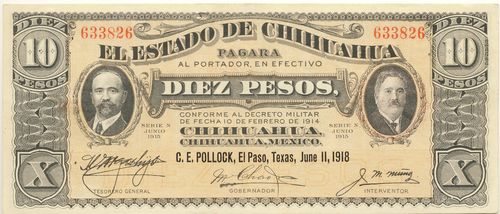
'C. E. POLLOCK, El Paso, Texas, June 11, 1918', known on $10 and $20 dos caritas
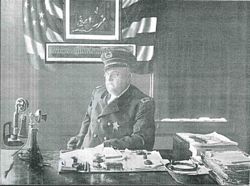 Charles E. Pollock was El Paso's Chief of Police from 11 October 1917 to 9 January 1919.
Charles E. Pollock was El Paso's Chief of Police from 11 October 1917 to 9 January 1919.
Harry Schifferle
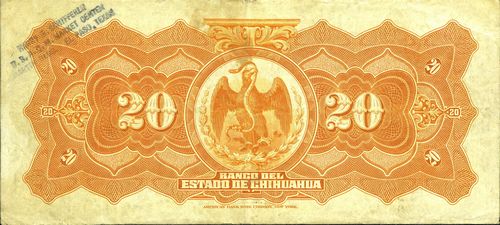
'HARRY [ ] SCHIFFERLE/U. S. A. G. M. MARKET CENTER/MARTIN BLVD. EL PASO, TEXAS', known on $20 Banco del Estado.
Schifferle was a marketing specialist, operating from 601-602, Martin Building in 1941El Paso Herald-Post, 24 April 1941.
David S. Shehady
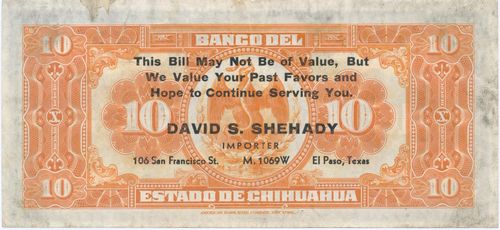
'This Bill May Not Be of Value, But / We Value Your Past Favors and / Hope to Continue Serving You. / DAVID S. SHEHADY / IMPORTER / 106 San Francisco St. M 1069W El Paso, Texas.', known on $5, $10 and $20 Banco del Estado
In November 1939 Shehady, an importer of Mexican art goods, wrote to the American Bank Note Company asking whether they could provide any more of these notesABNC, unnumbered folder, Banco del Estado de Chihuahua (1914-1939), letter David Shehady to ABNC, 4 November 1939.
M. D. Springer
Reported on Banco del Estado de Chihuahua $20 note[image needed].
On 5 January 1940, R, C. Whittinghill, the General Manager of R. C. Whittinghill & Co., 82 Duane Street, New York, asked whether it was permissible to use pesos, similar to an attached $20 Banco del Estado de Chihuahua (A 055398), as an advertisement on the reverse side, and if so, where he could obtain them. This particular note had an advertisement for M. D. Springer, Importer, 220 South El Paso Street, El Paso, Texas. On 8 January W. A. Courtney, of the ABNC, called at the office of the Secret Service and saw A. E. Whitaker, Jr., who said that they had not had any previous information regarding these notes, but confiscated it, and asked for full information about their manufacture. Mr. Whitaker called Whittinghill & Co. and told them the note had been confiscatedABNC, unnumbered folder, Banco del Estado de Chihuahua (1914-1939) letter R. C. Whittinghill & Co., New York to ABNC, 5 January 1940; letter Treasury Department, U. S. Secret Service to ANBC, 8 January 1940.

